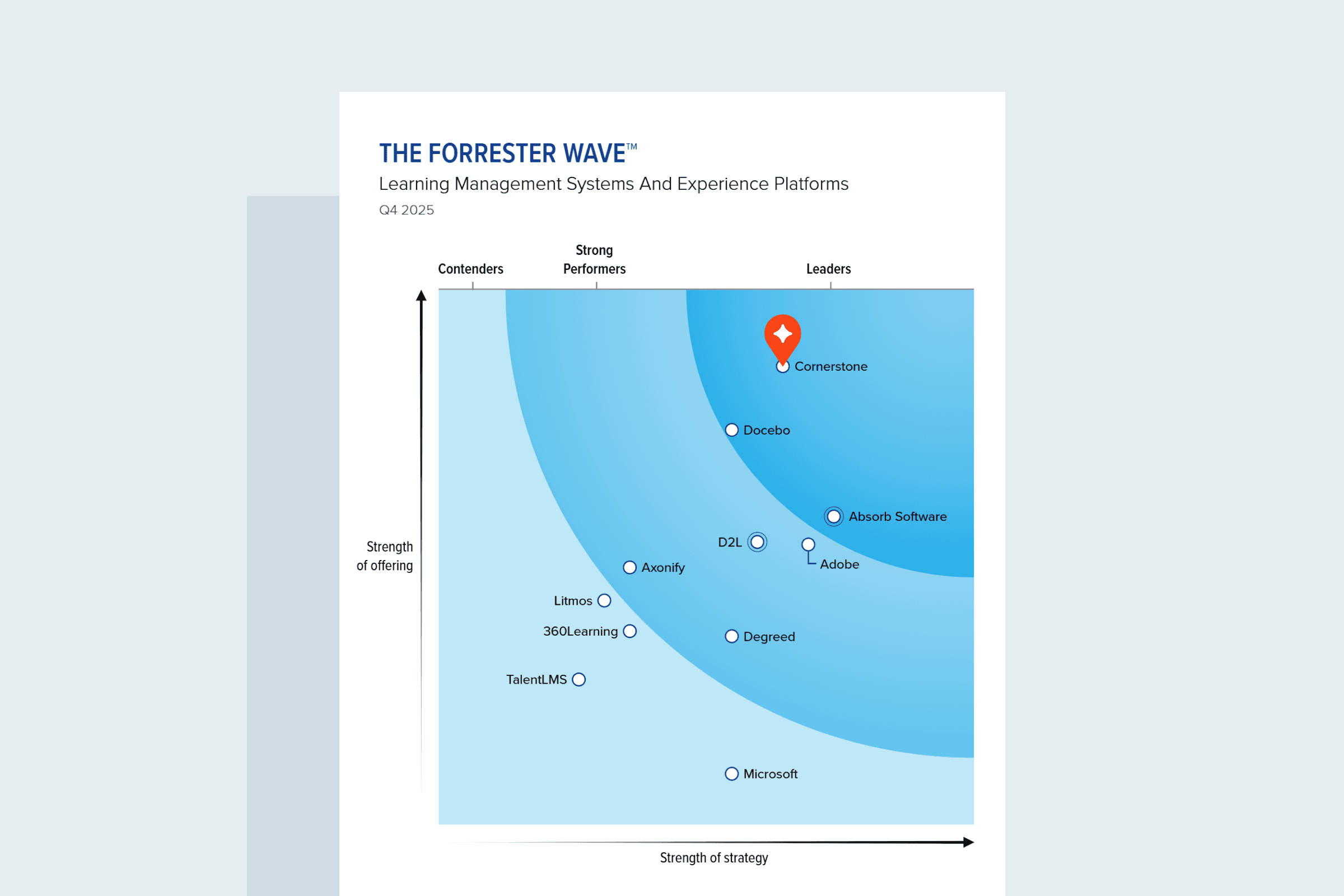Key Takeaways:
- Despite many organizations acknowledging the need for better employee development, only 5% felt they had achieved the highest skills maturity level.
- Integrating performance management with learning processes enhances the employee experience.
- The employee experience (EX) is crucial in attracting and retaining talent. By focusing on integrating development paths with organizational goals, organizations can effectively enhance employee engagement and satisfaction.
In 2022, the Cornerstone Thought Leadership and Advisory Services team (TLAS) met with over 200 customers from 155 unique organizations during a series of skills workshops. During these sessions, we collected insights into how customers are developing and maturing their approach to skills as it relates to their overall talent management strategy. We published a white paper on our findings — Your journey to career pathways and empowered employees.
We found that while most organizations know they must have a better way to develop employees, only 5% indicated that they felt there were “emergent” (highest level of maturity in our model) in their skills maturity, which meant they were well on their way with higher-level initiatives, such as career pathways.
7 Major Characteristics of Maturity
- Job Titles & Job Descriptions
- Skills Capabilities
- Career Pathways
- Job Architecture
- Learning Content & Skills Alignment
- Business Alignment
- Technology Enablement
These findings are shocking given that organizations understand the need to address a skills and capabilities gap, yet many still need to learn how to get started or accelerate their current state.
One of the highest priorities that emerged from the sessions was technology enablement. Participants felt they could move their maturity level from pre-administrative to optimized if they had technology connecting employees to the right developmental opportunities at the right time.
Yet, surprisingly, many of these organizations already had existing HRIS technologies. This surprise begs the question: If many organizations already have HCM (human capital management) technologies, why are they still in the infancy of developing a critical strategy to move their organizations forward?
One key reason is that they still have siloed experiences between their HCM and learning systems. This silo leaves the two primary key stakeholders — the employee and the manager — left to their own devices to figure out how to best close skill and performance gaps.
Performance and learning go hand-in-hand
One of the key factors of a great employee experience is having performance management and learning tied together. Employees need to understand their skill strengths and gaps, but they also need to know how to develop those and what resources and content are available to best close them.
“I want to do a bad job,” said no employee.
Yet, more often than not, we give employees feedback (if we provide that feedback regularly) on how they can improve or where the organization sees emerging skills. Then we leave it up to the employee and manager to figure out how to best close those gaps.
Development should immediately follow feedback
Some managers struggle with giving critical performance feedback because they don’t have readily available development prescriptions. This experience leaves managers and employees feeling frustrated.
In previous roles, I’ve led human resources departments. While in that role, a frustrated mid-level leader called me for advice one day. Their manager told them earlier in the year, “We need to get you ready for a vice president role.” But then there was no follow-up for six months — no further details about what that meant and what development needed to occur to be ready for the promotion. Eventually, the high-performing, high-potential leader left after feeling dejected from that experience.
Technology alone would not have cured the above situation, but having the infrastructure and tools readily available to help guide the manager and the employee through that career conversation might have salvaged the relationship and led to a better outcome.
Why the employee experience matters
An emerging role in talent management is one focusing solely on the employee experience or EX. For many organizations, the employee experience role is often responsible for overseeing onboarding, engagement, recognition and communication. A 2021 article by McKinsey refers to the employee experience as much more and calls it “moments that matter.”
You can erode employee engagement in five minutes or less
In the scenario shared above regarding employee promotion, a moment that mattered was just one conversation with a boss to reinforce and support an employee that they were building the right skills toward career advancement. Imagine the impact of that situation, given the number of employees an organization has and the number of times those conversations occur.
During this unchartered time of labor demand outweighing supply, organizations that purposefully design an integrated, holistic employee experience will have a better chance of attracting and retaining talent for at least a little longer than those that don’t. The same McKinsey article suggests that talent management executives should not design the employee experience in a vacuum but rather map out different employee personas and bring employees into the design process.
According to Gallup, employee experience directly affects retention and performance. “One-third of global employees strongly agree with the statement, “The mission or purpose of my organization makes me feel my job is important.” Gallup’s white paper “Designing Your Organization’s Employee Experience” suggests that by moving the engagement statement from 33% of people agreeing to an 80% agreement, companies have seen a 51% reduction in absenteeism, a 64% drop in safety incidents and a 29% improvement in quality.
-test
Integrate learning and performance to optimize the employee experience
Five key benefits will help you drive a more seamless employee experience by integrating your performance and learning processes.
Benefit #1: Alignment to ever-changing business priorities and goals
As Gallup’s research stated, employees’ engagement levels rise when they understand how what they do is linked to the overarching mission and vision of the organization. In today’s rapidly changing environment, organizations frequently pivot to adapt their strategies and goals to remain relevant. Leaders that can quickly realign their teams to the new priorities and goals will have a much better chance at executing than those who leave it up to employee interpretation.
For example, a rapidly growing startup may need to adjust its sales territory strategy in the middle of the year, causing sales professionals to have fewer accounts but going wider and deeper in building relationships in those accounts. A change such as this would result in sales professionals needing to be skilled in strategic account management and addressing the emotional side of the change (fear, anger, etc.).
Your talent management software must be flexible to adapt to the practical and personal side of business priorities.
Benefit #2: Increased velocity of skill attainment and skill deployment
That same rapidly growing startup’s sales team can more quickly adapt to the new norm by understanding the goals and performance expectations of their new situation and what skills, if any, their people need to develop to be successful.
You can reduce the time for productivity and the change curve by providing the right development and training those employees need to adapt to the changes occurring in the business. According to Prosci Change Management Methodology, two of the five key pillars of change management are related directly to learning — knowledge and ability. When employees have the knowledge and training to make a change happen, they are more likely to implement it, thus reducing the time it takes to go from awareness of the need to change to making the actual change.
Benefit #3: Assessing and understanding organization-wide skill and performance gaps
Another key benefit of integrating performance and learning is that it improves reporting and analytics. This improvement can be powerful for organizational leaders who want to drive a high-performance culture.
From a CEO perspective, understanding organization-wide capability in a data-driven way is a strategic advantage and asset. This information can change how the organization invests and prioritizes initiatives and brings HR to the forefront of strategic planning.
For example, a food manufacturer may want to invest in expanding its eCommerce platforms to drive more growth in international markets. What does a performance and skills assessment of their IT & Supply Chain department suggest about the ability to execute this strategy? Do people need to be skilled up in certain areas? Are there performance concerns that you need to address to make this initiative happen? Are the right leaders in place that can improve performance and drive skill development to make this a success?
The reporting and insights from an integrated performance and learning platform can enable an organization to answer those types of strategic workforce planning questions to plan out the execution of those strategies more thoughtfully.
Benefit #4: Reducing unconscious bias and improving inclusion and equity
“You can’t drive the bias out of the person; you have to drive it out of the process” – Josh Bersin, 2020 DEI study. Having disjointed performance and development processes inherently leads to more bias in how we evaluate and promote people.
According to SHRM, many unconscious biases can occur when a manager evaluates a person’s performance (recency effect, halo/horn effect, favoritism, lack of differentiation, etc.). Traditional performance management processes that solely rely on one rater (the manager) and high-potential/succession programs are often fraught with these types of biases. These processes also do not account for context and a level playing field when evaluating a person’s performance compared to a peer.
To root out these types of biases, it is important to ensure that you provide equitable development and learning opportunities for all employees to ensure a level playing field. When evaluating performance, we should consider if we have adjusted our evaluation for the following factors:
- Market
- Product
- Team
- Location
- Industry
- Learning Opportunities
Multiple evaluators
Performance management processes that don’t include multiple evaluators other than the manager and the employee will not produce an unbiased assessment of the person’s skills, performance and development opportunities. Incorporating peer ratings and other stakeholders (customers, vendors, others that work closely with the person) observations are critical to reducing bias.
Benefit #5: Improve internal career mobility to reduce the overall cost of hire
SHRM’s most recent calculation for a cost-of-hire is $4,700. According to the Saratoga Institute, the cost of an external hire is 1.7% more than the cost of an internal hire. If we use these numbers, we will arrive at the cost of $2,764 for an internal hire. Organizations that can increase the rate of internal placements (we are not just talking about vertical promotions) will reduce their overall labor costs by being able to move internal talent into more mid to senior-level positions while continuing to backfill with entry-level talent.
When discussing career mobility, we are no longer talking about upward growth. Bev Kaye, author, speaker, and consultant, wrote the book Up is Not the Only Way in 1997. In 2022, the notion of career mobility not just being about vertical growth has finally taken off, and that’s a good thing for organizations. Emerging generations coming into the workforce are not as concerned about climbing the corporate ladder as they are about growing their skills in multiple disciplines or being recognized as highly proficient.
The future of work will be more project-based and gig-based roles and assignments that allow people to apply newly learned skills to a variety of projects and assignments. The notion of an employee staying in one function or discipline for their entire career is already becoming outdated.
The optimized employee experience
Organizations that can create a seamless experience for employees by providing them with not only the development they need to learn new skills and improve upon existing skills but also the assignments, projects and open positions to apply those skills will have a much higher chance at retaining and engaging talent longer than organizations who don’t.
Don’t leave navigating performance improvement and skill development up to your managers and employees. If left to their own accord, they may end up going to your competitor or leaving your organization because they can’t figure out how to be successful. Providing holistic processes, tools and resources will help guide them and provide them with internal career path choices and opportunities.


